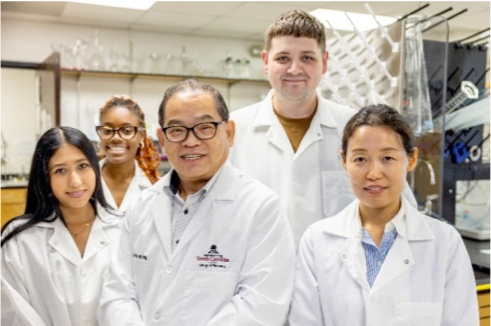Jun Zhu, MD, PhD

Jun Zhu, MD, PhD
ProfessorPharmacology & Toxicology
College of Science and Mathematics Bldg, GE 4014
Office phone icon: 706-721-8266
Lab phone icon: 706-721-8265

Members of the Lab
Jump to: Research Interest Education & Training Academic Appointments Honors Selected Publications
Research Interest
Dr Zhu’s main research is to determine the molecular mechanisms of HIV-1 infection-induced neurological disorders in HIV-1 patients with concurrent substance abuse. About one-half of HIV-1-positive individuals suffer from HIV-associated neurocognitive disorders (HAND), which dramatically affects memory, learning, decision-making, planning and overall quality of life. Drugs of abuse, such as cocaine and methamphetamine, have been shown to exacerbate the severity of HAND. HAND is associated with HIV-1 viral proteins, which are present in the brain of HIV-1-infected patients. For a long time, the idea of the HIV virus crossing the blood-brain barrier was not even considered, but it’s now clear that HIV-1 viral proteins are released in the brain where they disrupt normal brain functions. HIV-1 transactivator of transcription (Tat) protein, an HIV-1 regulatory protein, is thought to inhibit neuronal communication by acting directly on the human dopamine transporter (hDAT), norepinephrine transporter (hNET) and serotonin transporter (hSERT), presynaptic membrane proteins in the brain responsible for pumping the dopamine/norepinephrine/serotonin back into the cytosol and terminating the monoamine signaling during neurotransmission. The Zhu lab uses cutting edge computational modeling, pharmacological, genetic, and behavioral techniques to identify the mechanisms by which Tat perturbs the regulatory network of DAT, NET and SERT that normally sustains concentrative the neurotransmitters and potentiates cocaine’s effects on DAT, NET and SERT, resulting in monoamine dysregulation-linked neuropsychiatric dysfunction prominently featured in HAND.
Current ongoing research projects in Zhu’s laboratory:
-
- Molecular mechanisms: Dysregulation of monoamine transporters by HIV-1 Tat and cocaine: Our published work has demonstrated that HIV-1 Tat protein dysregulates monoamine transmission by its allosteric interaction with monoamine transporters (DAT, NET and SERT) in inducible Tat transgenic (iTat-tg) mice, suggesting that Tat protein dysregulates monoamine homeostasis via inhibition of monoamine transporters. This may potentially increase vulnerability to developing impulsivity, cognitive depression, and cocaine abuse in HIV-infected individuals. Ongoing studies will (1) through computational modeling and experimental validation, identify the recognition binding pockets on human SERT for Tat, cocaine, allosteric modulator and explore the potential interactions with Tat and cocaine, (2) characterize the pathophysiological role of the SERT in Tat- and cocaine-dysregulated monoaminergic transmission, and (3) perform the proof-of-concept studies using a pharmacological approach with chemical probes to establish their potential for therapeutic application in treating impulsivity and depression.
- Effects of HIV-1 Tat protein and methamphetamine on VMAT2-mediated dopamine transmission in the context of neuroHIV and drug abuse: DAT transports the extracellular dopamine into cytosolic space of the synaptic terminals, whereas the vesicular monoamine transporter2 (VMAT2) transports the cytosolic DA into synaptic vesicles, whereby both DA transporter and VMAT2 are critical for normal DA homeostasis. We have demonstrated that Tat protein increases extracellular DA concentration by directly inhibiting DAT, however, the cellular mechanisms underlying Tat-induced inhibition of VMAT2-mediated DA release/uptake remains unexplored. Ongoing studies will (1) through computational modeling and experimental validation, identify the recognition binding pockets on human VMAT2 for Tat, METH, or novel VMAT2 inhibitors and explore the potential interactions of the inhibitors with Tat and METH, (2) characterize the pathophysiological roles of VMAT2 in Tat- and METH-dysregulated DA system, and (3) perform proof-of-concept studies using pharmacological and genetic approaches as biological probes to establish their potential for therapeutic application in HAND in concurrent METH users.
- Allosteric Modulators of Dopamine Transporter as Therapeutic Agents for NeuroAIDS: This is a drug development project. Our published work has demonstrated that in vivo expression of Tat protein dysregulates monoamine transmission by its allosteric interaction with DAT, NET and SERT in inducible Tat transgenic (iTat-tg) mice. We have identified SRI- 32743, a novel allosteric modulator, which attenuates Tat-inhibited DA transport via DAT, NET or SERT and alleviates Tat-potentiated cognitive impairments and cocaine reward in iTat-tg mice. Through further structure activity relationship studies, we identified four analogs of SRI-32743 with improved solubility and metabolic stability. The four analogs display partial inhibitory capability for monoamine transporters and attenuate Tat-induced inhibition of DAT-mediated DA uptake through an allosteric mechanism. Ongoing studies will (1) design and synthesize novel allosteric ligands in recognition for Tat and cocaine binding sites on monoamine transporters as potential probes for in vivo pharmacological studies; (2) characterize the in vitro pharmacological profile of the compounds to identify optimized probe molecules; and (3) determine the therapeutic role of novel allosteric modulators in alleviation of Tat-mediated cognitive deficits and rewarding effects of cocaine in iTat-tg and EcoHIV mice.
Education & Post-doctoral Training
2000-2007
College of Pharmacy, University of Kentucky
1998
PhD
University of Fukui, School of Medical Sciences, Fukui, Japan (WES reference # 4070119)
1982
MD
Zhejiang University, School of Medicine, Hangzhou, Zhejiang, China
Academic Appointments
2025 - Present
Professor (Tenured)
Dept. of Pharmacology and Toxicology
Medical College of Georgia, Augusta University, GA
2018-2025
Professor (Tenured)
Dept. of Drug Discovery and Biomedical Sciences
College of Pharmacy, University of South Carolina, SC
2015-2018
Associate Professor (Tenured)
Dept. of Drug Discovery and Biomedical Sciences
College of Pharmacy, University of South Carolina, Columbia, SC.
2014-2018
Associate Professor
Dept. of Drug Discovery and Biomedical Sciences
College of Pharmacy, University of South Carolina, Columbia, SC.
2009-2014
Assistant Professor (Tenure track)
Dept. of Drug Discovery and Biomedical Sciences
College of Pharmacy, University of South Carolina, Columbia, SC.
2007-2009
Research Associate Professor
Dept. of Psychology
University of South Carolina, Columbia, SC.
1998-2000
Assistant Professor
Dept. of Pharmacology
Fukui Medical University, Fukui, Japan.
Honors
2024 | Annual Outstanding Research Award, College of Pharmacy, University of South Carolina
2023 | Japan Society for the Promotion of Science (JSPS) Invitational Fellowship Research Award
2023 | U of SC College of Pharmacy Established Researcher Award
2015 | Annual Award for Emerging Researcher of the year, South Carolina College of Pharmacy,
University of
South Carolina
2014 | Breakthrough Star Award from Office of the Vice President for Research, University of South Carolina
2004/2005/2006 | The Best Poster Award for Bluegrass Chapter of Society for Neuroscience Day in Lexington, KY
2005 | Travel Award for 67th Annual Scientific Meeting of the College on Problems of Drug Dependence (CPDD) in Orlando, FL
2003 | Travel Award for Nicotinic Receptor and Parkinson’s disease Satellite Symposium of Annual Meeting of Society for Neuroscience in New Orleans, LA
2002 | The ASPET Young Scientist Travel Award for the Annual Experimental Biology meeting in New Orleans, LA
1993-1998 | Educational Award by Japanese Ministry of Education, Sciences and Culture, Japan
Selected Publications
- Zhu J, Abagail B. Cirincione, Matthew J. Strauss, Sarah E. Davis, Shainnel O. Eans, Danielle K. Tribbitt, Nadine Alshakhshir, Jay P. McLaughlin. (2024) Impact of HIV-1 Tat protein on methamphetamine-induced inhibition of vesicular monoamine transporter2-mediated dopamine transport and methamphetamine conditioned place preference in HIV-1 Tat transgenic mice. European Journal of Pharmacology. PMC11563864.
- Jimenez-Torres AC, Hastie JA, Davis SE, Porter ED, Lei B, Moukha-Chafiq O, Zhang S, Nguyen TH, Ananthan S, Augelli-Szafran CE, and Zhu J (2024). Identification of pyrimidine structure-based compounds as allosteric ligands of the dopamine transporter as therapeutic agents for NeuroHIV. J Pharmacol Exp Ther. PMID: 39284625.
- Davis SE, Ferris MJ, Ananthan S, Augelli-Szafran CE, and Zhu J. Novel allosteric modulator SRI-32743 reverses HIV-1 Tat-induced increase in dopamine release in the caudate putamen of inducible Tat transgenic mice. Journal of Pharmacology and Experimental Therapeutics. 2022, PMCID: PMC9875314.
- Zhu J, Davis SE, Zhan CG and McLaughlin JP. Molecular mechanisms of dopaminergic transmission in NeuroHIV. 2022 Book chapter “HIV-Associated Neurocognitive Disorders.
- Strauss MJ, Porter KD, Quizon PM, Davis SE, Lin S, Yuan Y, Martinez-Muniz GA, Sun WL, Zhan CG, and Zhu J. Mutations of tyrosine 467 in the human norepinephrine transporter attenuate HIV-1 Tat-induced inhibition of dopamine transport while retaining physiological function. PLOS ONE 2022, Sep 28;17(9):e0275182. doi: 10.1371, PMCID: PMC9518868.
- Zhu J et al., SRI-32743, a novel allosteric modulator, attenuates HIV-1 Tat protein-induced inhibition of the dopamine transporter and alleviates the potentiation of cocaine reward in HIV-1 Tat transgenic mice. Neuropharmacology, 2022, 220 109239 PMID: 36126727.
- Davis S and Zhu J. Substance abuse and neurotransmission. Adv Pharmacol. 2022. 93:403-441.
- Quizon PM, Yuan Y, Zhu Y, Zhou Y, Strauss MJ, Sun WL, Zhan C-G, and Zhu J. Mutations of human dopamine transporter at tyrosine88, aspartic acid206, and histidine547 influence basal and HIV-1 Tat-inhibited dopamine transport. J Neuroimmune Pharmacol 2021. PMID: 33537927.
- Strauss M, O'Donovan B, Ma YZ, Xiao ZY, Lin S, Bardo MT, Ortinski PI, McLaughlin JP, Zhu J. [3H]Dopamine Uptake through the Dopamine and Norepinephrine Transporters is Decreased in the Prefrontal Cortex of Transgenic Mice Expressing HIV-1 Transactivator of Transcription Protein. Journal of Pharmacology and Experimental Therapeutics. 2020 374(2):241-251. PMCID: PMC7366287
- Sun WL, Quizon PM, Yuan Y, Strauss MJ, McCain R Jr, Zhan CG, Zhu J. Mutational effects of human dopamine transporter at tyrosine88, lysine92, and histidine547 on basal and HIV-1 Tat-inhibited dopamine transport. Sci Rep. 2019 PMCID: PMC6405875.
- Zhu J, Ananthan S, Zhan CG. The role of human dopamine transporter in NeuroAIDS. Pharmacol Ther. 2018 183:78-89. PMCID: PMC5817011.
- Sun WL, Quizon PM, Yuan Y, Zhang W, Ananthan S, Zhan CG, Zhu J. Allosteric modulatory effects of SRI-20041 and SRI-30827 on cocaine and HIV-1 Tat protein binding to human dopamine transporter. Sci Rep. 2017 PMCID: PMC5473888.
- Zhu J, Yuan Y, Midde NM, Gomez AM, Sun WL, Quizon PM, Zhan CG. HIV-1 transgenic rats display an increase in [3H]dopamine uptake in the prefrontal cortex and striatum. Journal of NeuroVirology. 2016 22(3):282-292. PMCID: PMC5330645.
- Quizon PM, Sun WL, Yuan Y, Midde NM, Zhan CG, and Zhu J. Molecular mechanism: the human dopamine transporter histidine 547 regulates basal and HIV-1 Tat protein-inhibited dopamine transport. 2016 Nature Scientific Reports PMCID: PMC5155291.
- Zhu J, Yuan Y, Midde NM, Gomez AM, Sun WL, Quizon PM, Zhan CG. HIV-1 transgenic rats display an increase in [3H]dopamine uptake in the prefrontal cortex and striatum. Journal of NeuroVirology. 2016 22(3):282-292. PMCID: PMC5330645.
- Gomez AM, Altomare D, Sun WL, Midde NM, Ji H, Shtutman M, Turner JR, Creek KE, Zhu J. Prefrontal microRNA-221 mediates environmental enrichment-induced increase of locomotor sensitivity to nicotine. The International Journal of Neuropsychopharmacology. 2015. PMCID: PMC4772274.
- Midde NM, Yuan Y, Quizon PM, Sun WL, Huang X, Zhan CG, Zhu J. Mutations at Tyrosine 88, Lysine 92 and Tyrosine 470 of Human Dopamine Transporter Result in an Attenuation of HIV-1 Tat-Induced Inhibition of Dopamine Transport. J Neuroimmune Pharmacol 2015. PMCID: PMC4388869.